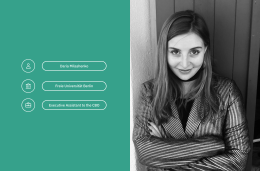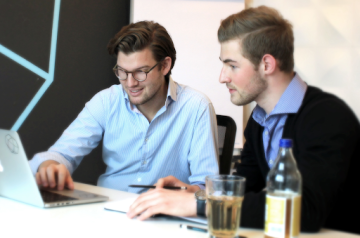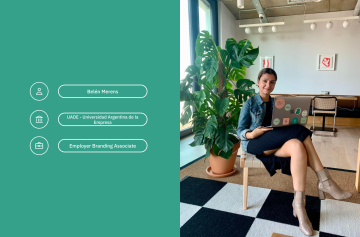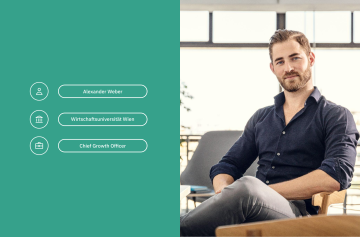
Team spotlight: Daria Milashenko, Executive Assistant to the CBO
When Daria Milashenko, Executive Assistant to the CBO at N26, visited Berlin at 15, it was love at first sight.
9 min read
Daria Milashenko was just 15 years old when fate came knocking at her door. While attending a week-long conference at the John F. Kennedy School in the Berlin neighborhood of Zehlendorf, the St. Petersburg native fell in love with the city. “It wasn’t the architecture, it was even rainy and cold the whole time I was here. Yet somehow, it touched my heart. I knew this was the place for me.” At 18, Daria moved to the German capital and attended a year of Studienkolleg, then majored in Journalism and Politics at the Freie Universität (FU). When fate struck again in the form of an internship at N26, she was ready. We sat down with Daria to talk about uni and how she ended up in her role as Executive Assistant to the CBO. Our interview has been edited and condensed for length and clarity. Hey Daria—let’s start out by talking a bit about your childhood. What are some vivid memories of that time? I was born and raised in St. Petersburg, the cultural capital of Russia and one of the most beautiful cities I’ve ever been to. I went to a music high school, which was a combination of all general subjects and music classes—piano lessons, music theory, etc. So, music, dance, theater, and opera visits were a big part of my daily life. I was also very passionate about learning about different cultures and travel, for which I have to thank my parents. Then, when I was 15, something life-changing happened. I got the chance to participate in a United Nations conference called BERMUN at the JFK School in Berlin. It’s a week-long conference for teens from around the world to come together in various committees to “simulate” the United Nations. I was part of the Human Rights committee, and was blown away by students’ English skills and deep knowledge they had on all sorts of topics. It was amazing, and I believe this decided my fate. I fell in love with this city.Sounds like fate, indeed. What were some of your favorite things about Berlin? I remember how I loved the smell of fresh bakery goods in the S- and U-Bahn, bringing an air of coziness. Think about it: it’s rainy and cold, you jump into the S-Bahn, buy coffee and rolls, and your life is just good! I have never seen it anywhere else—I really believe it's a Berlin thing. And, having gone to music school, I loved the music culture. I even started DJing myself a bit later on! Nowadays, I especially love summer in Berlin. One of my favorite things is all the options for how to spend your free time—from chilling at Krumme Lanke with students or visiting Wannsee with its white, soft sand. Or heading to Hauptbahnhof, where all you need is a Radler to enjoy the company of your friends next to the water—or a house party where you get to mingle with new people. Another thing that inspires me about Berlin is the feeling of freedom. No one here cares what clothes you wear or how you look, people just want to get to know you. That sounds like a powerful love! So, did you move to Berlin right after graduating? No, I waited a bit. I had no idea what I wanted to do—so with my dad’s help, I decided to study law in St. Petersburg. But one day, I was sitting with my friends after one of our lectures, and none of them could stop talking about a change in the constitution we’d discussed in class. I was puzzled: “The class is over,” I said. “Why are we still talking about this?” “Because it’s so interesting,” they answered, and that’s when I knew that I was in the wrong program. I came home and told my father—and I will never forget this—he said, “No problem. Go to Berlin.” And what did you do when you finally got here? One of the things I needed to do was to attend Studienkolleg—which I did at the Freie Universität. It’s essentially a year-long school for foreigners who need to qualify for the German Abitur (high school diploma). I’d passed the Goethe Institute exam for B2, yet I could barely speak any German. Passing an exam doesn’t mean that you can communicate well—we’re so trained in Russian school that we can essentially pass any exam, but we sometimes have trouble applying the information we’ve learned. So Studienkolleg was like German class and school at the same time. I had history, English, politics, literature—all the subjects which allowed me to apply to a German university. Studienkolleg helped me to not only gain confidence to start my university career, but it also gave me my closest friends who are really my second family here. After seven years, we’ve adapted to a new culture, overcome all sorts of bureaucratic difficulties, spent sleepless nights in the line at the Ausländerbehörde, and celebrated every milestone together. It’s a place where you can meet people in the same boat as you and become friends for life. So, tell me about your university life. I chose journalism, with politics as my second subject—I felt this combination would broaden my opportunities. Uni was the best time ever—and yet, it was also an unbelievably challenging experience, because I still struggled to communicate. Sometimes I didn’t understand what professors or other students were saying. But this also motivated me a lot—if I’d chosen to be there, then I felt I should be able to do it. There was no other way. One of my favorite classes was “Journalism as a Challenge” led by Dr. Saskia Sell. Dr. Sell’s way of working with students was so inspiring. We prepared presentations in groups, which connected us as students, and led to intense discussions and debates. I also wrote a paper at the end of the seminar on the topic of press freedom in Russia, and Dr. Sell really supported me with this project. But the brightest memory from my time there were the speakers that the school invited. Some were in German and some were in English, giving us this great variety of learning in two languages. One of the most exciting speakers was a woman, Jenna Brayton, who worked for Barack Obama. This was just an ordinary girl who dreamed of working with him and helping him with his campaign. Hearing her story confirmed for me that anything is possible. How did you make your way to N26? Applying to N26 was as much destiny as my move to Berlin. I had no colleagues here, no connections—but I used the product and loved it. So, when I saw the position of Working Student open up, I knew it would be great for me because I could contribute to something I enjoyed.Heather Maxwell, the right hand of Valentin [Stalf, N26 Co-Founder and CEO], had a very small team of working students serving as management support. I have never felt so welcome, appreciated, and taken care of as I did in this team. Eventually, I began supporting Thomas [Grosse, N26 Chief Banking Officer]. But after six months, I had to leave due to the COVID-19 pandemic. When Heather told me that I would need to leave, I wasn�’t even upset—she had given me this amazing chance, and I’ll be thankful to her for the rest of my days. But the story doesn’t end there, does it? No, it doesn’t! (Laughs) Later that year, I learned that the position of Banking Assistant had opened up and I applied. There was no guarantee I would get it, but I did! I was initially assisting managing directors, which was a wonderful new challenge, but Thomas’s assistant left, and we decided that I would support him full time. The funny thing is that now I’m a part of the CEO office where all the leadership’s assistants work. So, I came back to Heather and the team! And, I finally got my visa! I can’t express how happy I was—it’s one of my greatest achievements. Now I’ve even applied for a German passport. It would be the final point in my journey. That’s wonderful, it's a massive achievement. I want to talk a bit about your role. What do you do each day?At the moment, I’m supporting Thomas and the leadership team (his direct reports) and driving all the processes in the bank—starting from organizing the working area, up to all the core bank meetings. I’m also part of the CEO office team, and we collaborate 24/7—all the processes behind the curtains that are happening within the leadership team, it’s all organized by us. It’s a daily effort to make everything possible. What are some skills that you use in your job each day that you took from your time at uni?I would say that it’s being fearless and positive, which is a bit banal, but very important. Because there are many things that we don’t know, maybe things that we’re afraid of, but we should not fear failure. I learned to just go out and try, because there are many things that I had no idea how to do in the beginning, but with this fearless approach, you learn so much faster. Also, creative thinking—understanding that there are no situations that I can’t solve. Lastly, being proactive and willing to help others. I love resolving problems for people and making their lives easier. What are some lessons you took from university?I think the biggest life lesson is that you can accomplish anything with the support of your family and friends—people who believe in you. They are my rock and helped me achieve everything I did. And to pursue your dreams, whatever your heart desires, and don’t be afraid to fail. I just continue doing my thing, enjoying every experience—and even every awkward moment—being thankful for all the opportunities life has given me.What are your goals next? Are you happy in the banking industry?I would say that I’m here not because it’s the banking industry, I’m here because of incredible, talented, smart, and driven people—and the idea of the product. It’s not banking as we know it, it’s about an idea that drives people to make banking better, cooler, to make others want to jump on board. Getting to work with people who are all role models for me—there is nothing as exciting as that. I don’t know where my life will take me but for now, this is the coolest place I have been.
Find similar stories
BY N26Love your bank
Related Post
These might also interest youINSIDEN26Reflecting on 9 years at N26N26 Chief Growth Officer reflects on his 9-year journey at Europe’s leading digital bank
10 min read
INSIDEN26Employer Branding Associate Bel Merens on uni, travel, and living your dreamsTeam spotlight: Bel shares how she made her dream—moving to Europe to work for a popular FinTech—a reality.
9 min read
INSIDEN26CGO Alexander Weber on the practice and profession of entrepreneurshipNow our CGO, Alexander Weber has been with N26 for nearly 8 years. Learn how he decided to study business and why he thinks being an entrepreneur is about vision, passion, and intrinsic motivation.
8 min read


